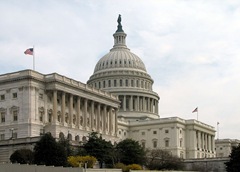Yesterday was quite a news day. BP capped the well. Congress passed what AP headline writers termed a “stiff financial reform bill.” And the SEC announced a $550 million settlement with Goldman Sachs. The coincidence of those second and third items is quite remarkable, don’t you think?
The SEC made its announcement within hours of the bill passing, while the stock market was still open. Generally,  news like that is kept under a tight lid while the stocks concerned trade, ideally until early the next morning. But then the bill and the settlement would have been in different news cycles.
news like that is kept under a tight lid while the stocks concerned trade, ideally until early the next morning. But then the bill and the settlement would have been in different news cycles.
I must say, as an aside, that I am saddened by the settlement. The SEC’s case was largely imaginary and I am particularly irked by the $250 million going to a pair of European banks, apparently to compensate them for being idiots. I am sure that had Goldman gone to court it would have, eventually, won. But truth and justice are sometimes subordinate to good business. $550M is about two weeks of profit for Goldman, and if the deal comes with a gentleman’s agreement to be left alone for a few years then it was money well spent. Goldman’s market cap is up more than $5 billion on the news.
Read more »
[Habitual readers of BMA know that I belong to an obscure sect that prohibits blogging on Thursdays. I realize that leaves many of you with time to kill and that some of you have not yet read every one of the 317 posts I’ve lovingly hand-crafted for your enjoyment. So today I inaugurate what may become a regular habit: The Thursday Rerun.
Today’s originally ran July 27, 2009.]
Friday’s edition of Wealth Matters in the New York Times told us about the children of rich people. Turns out that if you are rich enough, instead of just  relying on your spouse, you can hire somebody to tell you what a lousy parent you are.
relying on your spouse, you can hire somebody to tell you what a lousy parent you are.
One of the several intriguing things about Wealth Matters is that the author apparently doesn’t know any rich people, or at least none that will allow him to quote them. Instead, the columns seem to be written based on talking to people who talk to rich people. Or so they claim.
Read more »
It is rare that I read something I wished I had written, and even rarer that it come from a source belonging to the old media. When that happens I get one of my infrequent opportunities to write something positive.
So today I write nice things about a post at The Atlantic by Megan McArdle. (Okay, so a blog post is not exactly old media, but it’s from the The Atlantic, a magazine older than most rocks.) Of course, in saying nice things about that post I will be saying un-nice things about its subject, the New York Times. There is only so charming I can be.
Last week the Times, a publication I really need to learn not to take seriously, ran an article on its front page that was moronic even by its own rapidly decaying standards. Biggest Defaulters on Mortgages Are the Rich told us that rich folks are more likely to strategically default on their mortgage than ordinary wholesome middle class folks.
Read more »
In certain circles there has always been plenty of discussion of credit reports and scores. But since the Great Recession, interest in the topic has grown to the verge of mainstream consciousness. Ordinary folks now routinely consider the credit score impact of their actions, including such esoteric issues as the undesirability of closing unused credit card accounts. (It increases the ratio of used to available credit, which is bad.)
credit score impact of their actions, including such esoteric issues as the undesirability of closing unused credit card accounts. (It increases the ratio of used to available credit, which is bad.)
But through all this it seems as if the underlying point of credit scores has been lost. It is not a game with arbitrary rules meant to keep consumers on their toes. Nor is it a measure of virtue.
If you are in the business of lending money, what you want to know about a potential borrower boils down to a simple question: will this person pay me back? Credit scores do nothing more than give a probability that a borrower will make good, based primarily on his history of paying other people back, but also considering such measures of financial stress as how many times he has asked for a loan recently and the credit lines to credit used ratio mentioned above.
Read more »
I am always amused by things that started as a mocking joke but then, through repetition, slowly became  unfunny enough that they were taken seriously. The word “software,” once used derisively by engineers who built actual electronics to refer to the work of their programmer counterparts, is a good example. Daylight savings time, first proposed in a satirical essay by Ben Franklin in 1784 is another.
unfunny enough that they were taken seriously. The word “software,” once used derisively by engineers who built actual electronics to refer to the work of their programmer counterparts, is a good example. Daylight savings time, first proposed in a satirical essay by Ben Franklin in 1784 is another.
To this list of the absurd becoming ordinary we can now add the idea that richer Americans should arrange to die in 2010 to save on estate taxes.
In May 2008 the Wall Street Journal ran an article with the eye-catching title of Death by Taxes: Seniors May Plan Their Demises to Maximize Their Bequests. But the author made clear his humorous intent in the opening paragraph.
Read more »
 news like that is kept under a tight lid while the stocks concerned trade, ideally until early the next morning. But then the bill and the settlement would have been in different news cycles.
news like that is kept under a tight lid while the stocks concerned trade, ideally until early the next morning. But then the bill and the settlement would have been in different news cycles.


